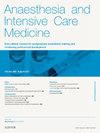肾移植手术麻醉
IF 0.2
Q4 ANESTHESIOLOGY
引用次数: 0
摘要
肾移植是最常见的实体器官移植手术,也是治疗终末期肾病(ESRD)的首选方法。这些患者对麻醉师提出了一系列独特的挑战,而麻醉师对移植器官的直接成功起着至关重要的作用。本文介绍了对成年肾移植患者的评估、围术期管理和术后目标。本文章由计算机程序翻译,如有差异,请以英文原文为准。
Anaesthesia for renal transplantation
Renal transplantation is the most common solid organ transplant performed and it is the treatment of choice for end-stage renal disease (ESRD). These patients present a unique set of challenges to the anaesthetist, who has a crucial role in the immediate success of the transplanted organ. This article describes the assessment of the adult patient for renal transplantation, the perioperative management and the aims in the postoperative period.
求助全文
通过发布文献求助,成功后即可免费获取论文全文。
去求助
来源期刊

Anaesthesia and Intensive Care Medicine
ANESTHESIOLOGY-
CiteScore
0.50
自引率
0.00%
发文量
152
期刊介绍:
Anaesthesia and Intensive Care Medicine, an invaluable source of up-to-date information, with the curriculum of both the Primary and Final FRCA examinations covered over a three-year cycle. Published monthly this ever-updating text book will be an invaluable source for both trainee and experienced anaesthetists. The enthusiastic editorial board, under the guidance of two eminent and experienced series editors, ensures Anaesthesia and Intensive Care Medicine covers all the key topics in a comprehensive and authoritative manner. Articles now include learning objectives and eash issue features MCQs, facilitating self-directed learning and enabling readers at all levels to test their knowledge. Each issue is divided between basic scientific and clinical sections. The basic science articles include anatomy, physiology, pharmacology, physics and clinical measurement, while the clinical sections cover anaesthetic agents and techniques, assessment and perioperative management. Further sections cover audit, trials, statistics, ethical and legal medicine, and the management of acute and chronic pain.
 求助内容:
求助内容: 应助结果提醒方式:
应助结果提醒方式:


